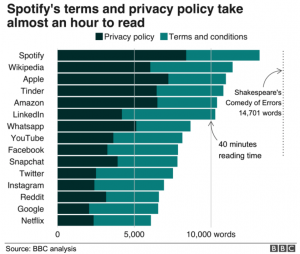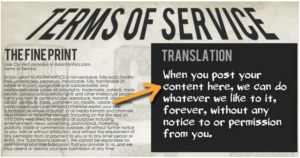Do we actually agree to these terms and conditions?
By Anonymous | July 9, 2021

Every time I go on to a new website or online service there is a pop up of a terms of service agreement and privacy policy. Now this pop up agreement covers three quarters of the page and at the bottom right has two buttons, I Agree or Decline. Now in this scenario, do you think I read every line of this long document carefully and take time to consider what I am agreeing to or do you think I quickly move the scrollbar to the bottom without reading a single word and press I Agree without thinking much about it. Like most of the online population, I always do the latter. In fact, a 2017 study by Deloitte found that 91% of consumers accept the terms and conditions without reading them (Cakebread, 2017). ProPrivacy.com, a digital privacy group claims that number is higher with only 1% of subjects in a social experiment actually reading the terms of conditions (Sandle, 2020). The other 99% of survey respondents actually agreed to absurd things from the terms and conditions like permission to give their mother full access to their browsing history, the name rights to their first-born child, the ability to “invite” a personal FBI agent to Christmas dinner for the next 10 years, and so forth (Sandle, 2020). Now since they clicked on the I Agree button, does that mean that if ProPrivacy.com really wanted to name their first-born child, could they dispute that? This question of ability to dispute an agreed upon terms of service boils down to the question, “Does clicking the I Agree button signify their informed consent?”
I argue that even though they indeed pressed the button, it isn’t informed consent through the lens of the first belmont principle, respect for persons. The Belmont Report was published in 1979 in response to ethical failures in medical research. In the Belmont Report, it outlined three ethical principles for the protection of human subjects in research: 1) Respect for persons; 2) Beneficence; and Justice. Respect for persons is about participants giving informed consent to be in the research. Informed consent is broken down further to say that participants should be presented with relevant information in a comprehensible format and then should voluntarily agree to participate. Do the terms of service include relevant information in a comprehensible format? This is debatable, as the terms of service do include all the relevant information but it is always too long to read it in a reasonable amount of time.

Terms and conditions are not in a comprehensive format as they are really difficult to read and often employ legalese, terminology and phrasing used by those in the legal field. A study from Boston College Law found that the terms of service of the top 500 websites in the U.S., had the average reading level of articles in academic journals which do not have the terminology used by the general public(Benoliel & Becher, 2019). So even if people try to carefully read these long terms of service, they may not understand what they are agreeing to. In terms of voluntarily agreeing to terms of service, while it isn’t forced acceptance, the acceptance of the terms is needed to use the website. So saying no to the terms of service isn’t a no penalty result, rather it will prevent you from the service that you wanted.

So, how can we turn the agreements of terms of service into actual informed consent? Some ideas are: having summaries on the side of the terms of service so that it is more comprehensible, having important parts bolded and highlighted for people to notice and read them, and making a mandatory wait time before they can click on the Agree button so that people must spend some time on the terms of services to read it through.
References
Benoliel, U., & Becher, S. I. (2019). The Duty to Read the Unreadable. SSRN Electronic Journal. https://doi.org/10.2139/ssrn.3313837
Cakebread, C. (2017, November 15). You’re not alone, no one reads terms of service agreements. Business Insider. https://www.businessinsider.com/deloitte-study-91-percent-agree-terms-of-service-without-reading-2017-11.
Sandle, T. (2020, January 29). Report finds only 1 percent reads ‘Terms & Conditions’. Digital Journal. https://www.digitaljournal.com/business/report-finds-only-1-percent-reads-terms-conditions/article/566127.
